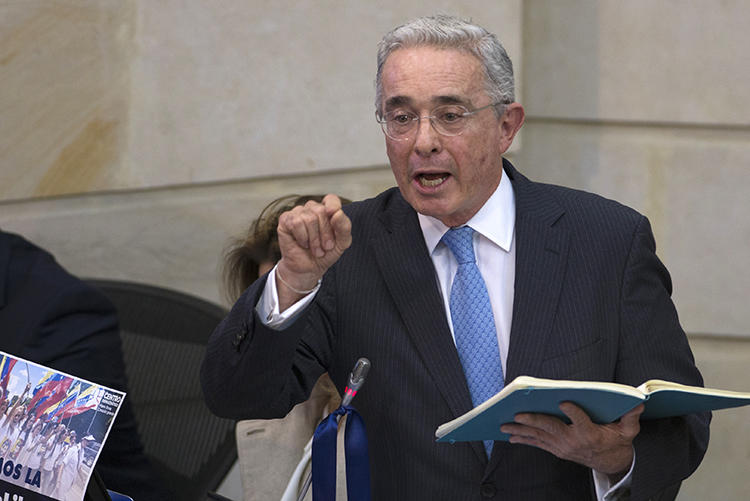New York, May 8, 2019 — The Committee to Protect Journalists is deeply concerned by civil defamation lawsuits filed in the U.S. state of Florida against journalist Daniel Coronell by former Colombian president Álvaro Uribe Vélez, now a senator, and his allies, which could have a chilling effect on reporting on the Colombian politician.
In a lawsuit served to Coronell yesterday, which CPJ has reviewed, Uribe alleges that Coronell committed “defamation by implication,” arguing that the journalist juxtaposed a series of facts to create “false innuendos” that the former president had engaged in illegal activities, witness tampering, and obstruction of justice. The suit is seeking damages for an unspecified amount that “exceeds $15,000.” It does not specify which of Coronell’s claims are alleged to be false.
Uribe filed the suit at the Miami-Dade Circuit Court on March 30, and an officer of the court served Coronell with the lawsuit yesterday, according to the journalist, who spoke with CPJ. He has 20 days to respond to the complaint, Coronell told CPJ.
Coronell is president of news for the Spanish-language U.S. television network Univision and a columnist at Colombian news weekly Semana, and is a dual U.S.-Colombian citizen, he told CPJ.
CPJ emailed Uribe’s senate office for comment but did not receive a reply.
Coronell is also facing one lawsuit and one retraction demand from lawyers who have ties to Uribe, in what the journalist told CPJ he believes is a coordinated campaign to silence his critical reporting on multiple investigations into conduct by the former head of state.
“Former President Álvaro Uribe is the subject of multiple official investigations in Colombia, so it is natural and even essential for an investigative journalist to report on him critically,” said Alexandra Ellerbeck, CPJ’s North America program coordinator. “Uribe and his allies should stop harassing Daniel Coronell, and let the journalist pursue his work without fear of legal reprisal.”
Uribe’s lawsuit was filed in response to an October 13, 2018, article that Coronell published in Semana entitled “This is how they prepared the declaration of Tuso Sierra,” according to the suit. Uribe filed suit after first sending a letter demanding a retraction on February 19, which CPJ has reviewed; Coronell did not retract the story.
The Semana article details the interactions between Diego Cadena, a lawyer close to Uribe, and Juan Carlos Sierra (known as “El Tuso”), a witness to a Supreme Court investigation. In the piece, Sierra is quoted stating that an unnamed lawyer pressured him to sign a letter absolving Uribe’s cousin of criminal activity with paramilitary groups.
On March 22, Coronell received a letter from Cadena demanding a retraction. The letter, which CPJ has reviewed, notes that Florida law requires a demand for retraction before a defamation suit can be filed, although Cadena has not filed suit against Coronell, according CPJ’s search of the Miami-Dade court database.
Coronell is also facing a defamation lawsuit in the Miami-Dade Circuit Court, filed in February 2018 and which CPJ has reviewed, from Colombian lawyer Abelardo De La Espriella relating to a piece that Coronell wrote in Semana in January 2018 called “The Plane.” In the article, Coronell raised questions about the origins of the young lawyer’s wealth, including a private jet. The suit alleges that the article constitutes defamation by implication. The suit is also seeking at least $15,000 in damages.
Both Cadena and De La Espriella were identified as Uribe’s personal lawyers in a tweet by the former president in March.
Florida, like many states in the U.S., has what is known as an anti-SLAPP (Strategic Lawsuit Against Public Participation) law, which seeks to limit the ability of litigants to censor critics by tying them up in protracted and costly defamation litigation, according to the Digital Media Law Project.
Katie Townsend, the legal director for the Reporters Committee for Freedom of the Press and Coronell’s co-counsel in the De La Espriella suit, told CPJ that the lawsuits against Coronell are “textbook examples” of the types of suits anti-SLAPP laws were designed to prevent.
In April, Coronell published an article titled “Why Do They Want to Silence Me?” in Semana, in which he alleges that Cadena conspired with a close ally of Uribe to bring cases against the journalist in Florida, citing communications from June 2018 that were intercepted by the Colombian attorney general’s office.
Bruce Rogow, the lawyer representing both De La Espriella and Cadena, told CPJ that he is sympathetic to the needs of a free press but stands by the claims of his clients.
Uribe, who served as president from 2002 to 2010 and as a senator since 2014, has been embroiled in investigations relating to his activities in office, including a Supreme Court case alleging that he engaged in witness intimidation as a senator; Cadena has been called in for questioning in relation to that case, according to news reports.
In 2010, while Uribe was president, Colombia’s now defunct intelligence agency, the Administrative Department of Security, targeted Coronell for surveillance, according to CPJ reporting from the time. While Uribe has denied that he had any involvement in spying on journalists and opposition figures, the former subdirector of the intelligence agency implicated him in illegal surveillance activities, and the Supreme Court has asked the House of Representatives to investigate his involvement, according to news reports.
Editor’s Note: This text has been updated to correct the spelling of President Uribe’s name and to include Katie Townsend’s affiliation with the Reporters Committee.
Katie Townsend, the legal director for the Reporters Committee for Freedom of the Press
